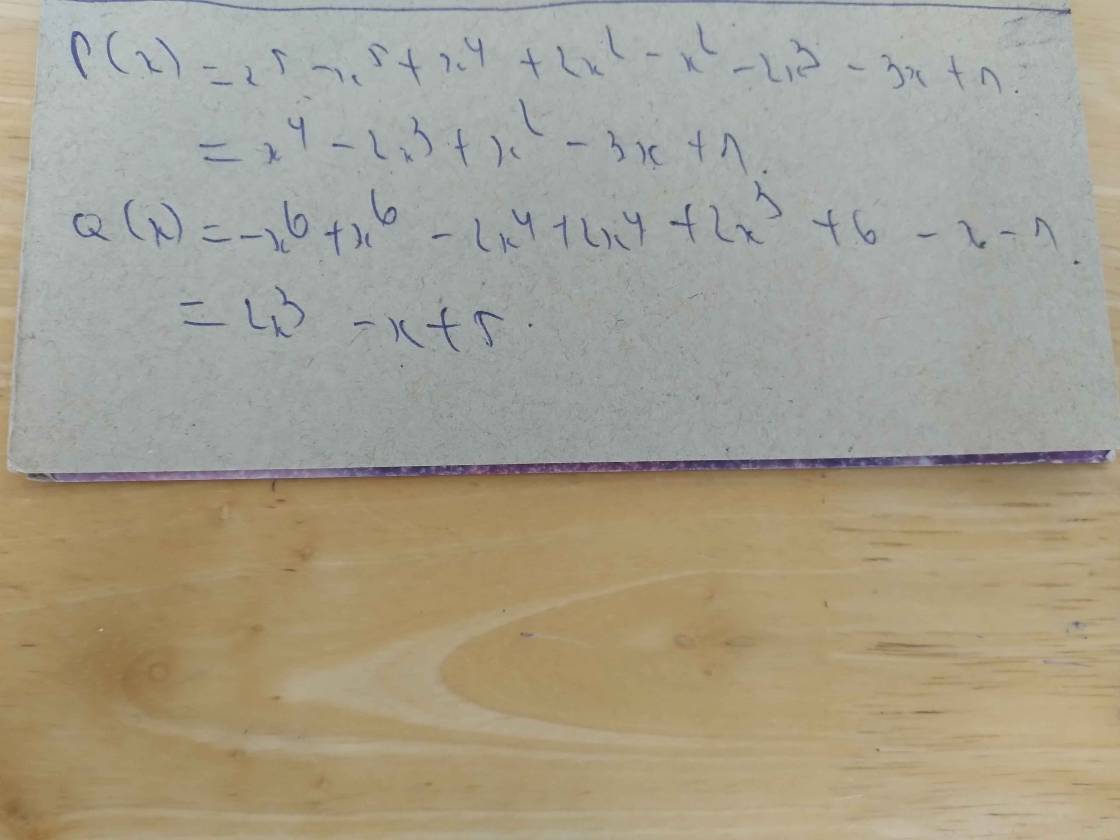Hãy nhập câu hỏi của bạn vào đây, nếu là tài khoản VIP, bạn sẽ được ưu tiên trả lời.

Lời giải:
1.
\(M(x)=A(x)-2B(x)+C(x)\)
\(2x^5 – 4x^3 + x^2 – 2x + 2-2(x^5 – 2x^4 + x^2 – 5x + 3)+ (x^4 + 4x^3 + 3x^2 – 8x + \frac{43}{16})\)
\(=5x^4+2x^2-\frac{21}{16}\)
2.
Khi $x=-\sqrt{0,25}=-0,5$ thì:
\(M(x)=5.(-0,5)^4+2(-0,5)^2-\frac{21}{16}=\frac{-1}{2}\)
3)
$M(x)=0$
$\Leftrightarrow 5x^4+2x^2-\frac{21}{16}=0$
$\Leftrightarrow 80x^4+32x^2-21=0$
$\Leftrightarrow 4x^2(20x^2-7)+3(20x^2-7)=0$
$\Leftrightarrow (4x^2+3)(20x^2-7)=0$
Vì $4x^2+3>0$ với mọi $x$ thực nên $20x^2-7=0$
$\Rightarrow x=\pm \sqrt{\frac{7}{20}}$
Đây chính là giá trị của $x$ để $M(x)=0$

a: Khi x=1/3 thì \(A=3\cdot\dfrac{1}{9}-6\cdot\dfrac{1}{3}+5=\dfrac{10}{3}\)
Khi x=-2 thì \(A=3\cdot4-6\cdot\left(-2\right)+5=12+12+5=29\)
b: Trường hợp 1: x=2; y=-3
\(C=2\cdot2^2-3\cdot2\cdot\left(-3\right)+4\cdot\left(-3\right)^2=62\)
Trường hợp 2: x=-2; y=-3
\(C=2\cdot\left(-2\right)^2-3\cdot\left(-2\right)\cdot\left(-3\right)+4\cdot\left(-3\right)^2=26\)

\(a,f\left(1\right)=3\cdot1^2+1+1=5\\ f\left(-\dfrac{1}{3}\right)=3\cdot\left(-\dfrac{1}{3}\right)^2-\dfrac{1}{3}+1=\dfrac{1}{3}-\dfrac{1}{3}+1=1\\ f\left(\dfrac{2}{3}\right)=3\cdot\left(\dfrac{2}{3}\right)^2-\dfrac{2}{3}+1=\dfrac{4}{3}-\dfrac{2}{3}+1=\dfrac{5}{3}\\ f\left(-2\right)=3\cdot\left(-2\right)^2-2+1=11\\ f\left(-\dfrac{4}{3}\right)=3\cdot\left(-\dfrac{4}{3}\right)^2-\dfrac{4}{3}+1=\dfrac{16}{3}-\dfrac{4}{3}+1=5\)
\(b,f\left(\dfrac{2}{3}\right)=\left|2\cdot\dfrac{2}{3}-9\right|-3=\dfrac{23}{3}-3=\dfrac{14}{3}\\ f\left(-\dfrac{5}{4}\right)=\left|2\cdot\left(-\dfrac{5}{4}\right)-9\right|-3=\dfrac{23}{2}-3=\dfrac{17}{2}\\ f\left(-5\right)=\left|2\left(-5\right)-9\right|-3=19-3=16\\ f\left(4\right)=\left|2\cdot4-9\right|-3=1-3=-2\\ f\left(-\dfrac{3}{8}\right)=\left|2\cdot\left(-\dfrac{3}{8}\right)-9\right|-3=\dfrac{39}{4}-3=\dfrac{27}{4}\)
\(c,x=0\Rightarrow y=2\cdot0^2-7=-7\\ x=-3\Rightarrow y=2\cdot\left(-3\right)^2-7=11\\ x=-\dfrac{1}{2}\Rightarrow y=2\cdot\left(-\dfrac{1}{2}\right)^2-7=\dfrac{-13}{2}\\ x=\dfrac{2}{3}\Rightarrow y=2\cdot\left(\dfrac{2}{3}\right)^2-7=-\dfrac{55}{9}\)

`P(x)=x ^ 5 + 2x ^ 2 - x ^ 2 - 2x ^ 3 - x ^ 5 + x ^ 4 - 3x + 1`
`P(x)= (x^5-x^5)+x^4-2x^3+(2x^2-x^2)-3x+1`
`P(x)=x^4+2x^3+x^2-3x+1`
`Q(x)=`\(-x^6+2x^3+6-2x^4+x^6-x-1+2x^4\)
`Q(x)= (-x^6+x^6)+(-2x^4+2x^4)+2x^3-x+(6-1)`
`Q(x)=2x^3-x+5`

\(\Leftrightarrow6x-3y=2x+2y\)
\(\Leftrightarrow4x=5y\)
Vậy: Chọn D

\(\dfrac{2x-y}{x+y}=\dfrac{2}{3}\Leftrightarrow3\left(2x-y\right)=2\left(x+y\right)\\ \Leftrightarrow6x-3y=2x+2y\\ \Leftrightarrow4x=5y\Leftrightarrow\dfrac{x}{y}=\dfrac{5}{4}\left(D\right)\)

+) Lỗi nhỏ: Sai ở chỗ: \(\left|x-2+4-3x\right|=\left|-2x-2\right|\)
+) Lỗi lớn: Dấu bằng xảy ra: \(\hept{\begin{cases}\left(x-2\right)\left(4-3x\right)\ge0\\\left(-2x+2\right)\left(2x-3\right)\ge0\end{cases}\Leftrightarrow}\hept{\begin{cases}\frac{4}{3}\le x\le2\\\frac{3}{2}\le x\le1\end{cases}}\Leftrightarrow\frac{3}{2}\le x\le1\)( làm tắt )
Nhưng mà thử vào chọn x= 1=> A = 3 > 1. Nên bài này sai.
Làm lại nhé!
A = | x - 2 | + | 2 x - 3 | + | 3 x - 4 |
= | x - 2 | + | 2 x - 3 | + 3 | x - 4/3 |
= | x -2 | + | x - 4/3 | + | 2x -3 | +2 | x - 4/3 |
= ( | 2 - x | + | x - 4/3 | ) + ( | 3 - 2x | + | 2x - 8/3 | )
\(\ge\)| 2 -x + x - 4/3 | + | 3 - 2x + 2x -8/3 |
= 2/3 + 1/3 = 1
Dấu "=" xảy ra <=> \(\hept{\begin{cases}\left(2-x\right)\left(x-\frac{4}{3}\right)\ge0\\\left(3-2x\right)\left(2x-\frac{8}{3}\right)\ge0\end{cases}\Leftrightarrow}\hept{\begin{cases}\frac{4}{3}\le x\le2\\\frac{4}{3}\le x\le\frac{3}{2}\end{cases}}\Leftrightarrow\frac{4}{3}\le x\le\frac{3}{2}\)

aanh giúp em câu hóa này vs